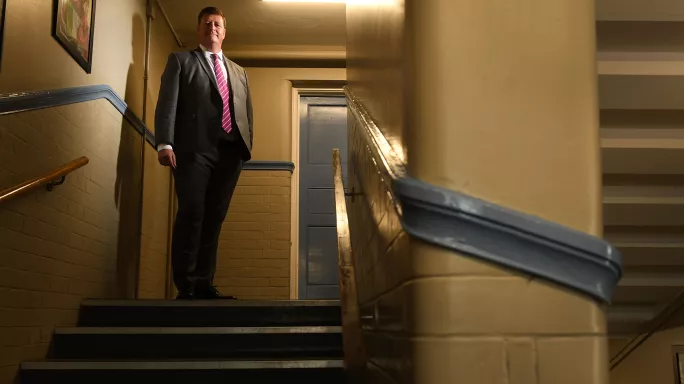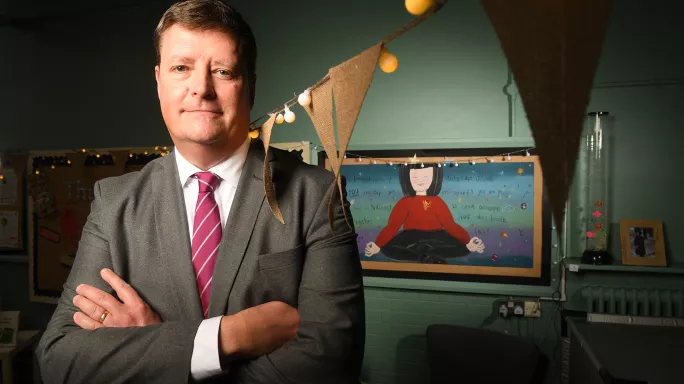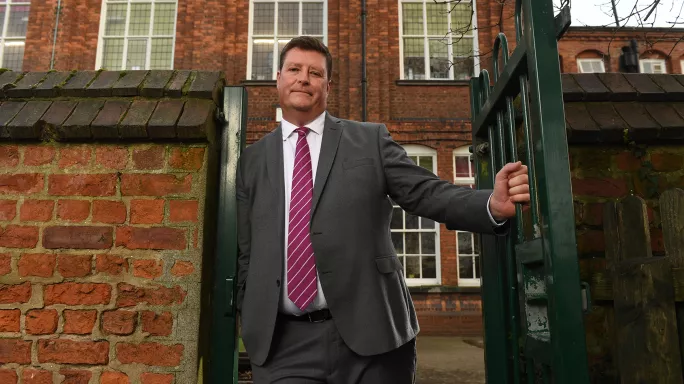How Sir Martyn Oliver plans to fix Ofsted

Sir Martyn Oliver has a difficult job on his hands: to change the way you think about Ofsted.
To begin that process he has made a big call on day one of his tenure as Ofsted’s chief inspector: routine school inspections will not resume until inspectors have undergone weeks of “significant” training in response to the inquest into the death of headteacher Ruth Perry.
The coroner ruled that an Ofsted inspection likely contributed to the death of Ms Perry and that there was a risk of future deaths unless action was taken to address concerns about school inspection.
Former chief inspector Amanda Spielman was criticised in some quarters for her perceived failure to respond to those concerns. In contrast, Sir Martyn says routine inspections of schools in the first few weeks of 2024 will be delayed until he is “convinced” and “happy” that lead inspectors have undergone “external” and “expert” training. Inspections over safeguarding concerns will continue.
At the beginning of next week, Sir Martyn will lead the initial training for all inspectors. The session will also include training and support from Mental Health First Aid (MHFA) England. Details of this training will be published, the watchdog says.
In Sir Martyn’s first week in the job, he has also arranged to meet Ms Perry’s sister, Professor Julia Waters. “I think the really important thing now is to listen to the family and then listen to the sector,” he says. He is clear that there needs to be “an emergency, instant response”.
That this is just one of many calls Sir Martyn will be forced to make in his first months in charge shows the difficulty of the job he has taken on: he has an in-tray that could hardly be more daunting.
Sir Martyn Oliver’s priorities for Ofsted
The watchdog has lost the confidence of many leading voices in the schools sector and faces mounting pressure for major reform. As Charlotte Santry detailed in Tes last summer, the challenges that need to be tackled to enable schools to trust Ofsted again are multiple and complex.
In his first interview since taking up the role, it is clear that Sir Martyn wants the sector to know that he recognises these challenges first-hand. Sitting in a primary school in York - the city he will be based in as chief inspector - rather than in Ofsted’s head office in London, he answers many of Tes’ questions by speaking firstly as a former head and multi-academy trust leader. The signal he wants to send out is clear: he’s one of you.
Until Christmas, of course, he was exactly that: he led Outwood Grange Academies Trust, a 41-school MAT, for seven years, having joined the trust in 2009, when he became principal of Outwood Grange Academy, and having worked in schools since starting as a teacher in 1995.
The trust was praised for raising standards, while also being criticised at times for its stringent approach to discipline. It was also widely understood as being very much led from the centre.

And like many of his former colleagues, Sir Martyn was also a strident and high-profile critic of the current Ofsted school inspection framework.
So how will his experience filter through into how he runs the organisation?
As chief inspector, he says he accepts the criticism being levelled at the inspectorate and says the watchdog needs to respond to this “in a non-defensive way”.
He believes Ofsted needs a fresh start in 2024 and has committed to inspecting schools with “courtesy, professionalism, respect and empathy”.
Throughout the interview, Sir Martyn returns to this phrase repeatedly. His vision is for inspection to be recognised as something that is done with schools rather than to them.
He is at pains to say that most of the 96 inspections he has attended have been like this. But he also provides practical examples of what he wants this empathy to look like on the ground.
- Next steps: What should Sir Martyn prioritise as Ofsted chief?
- Sir Martyn Oliver: Who is Ofsted’s next chief inspector?
- Demands for change: Is there any way back for Ofsted?
For instance, he says he understands the challenges that schools currently face: attendance, behaviour, teacher recruitment and retention, and the cost-of-living crisis. And he wants to “make sure that our inspectorate workforce understands” these issues, too.
He says this can partly be achieved by driving “an exponential increase” in the number of serving school leaders working as Ofsted inspectors.
“I want to move to a position where school leaders can be confident that the [inspectors] on the team are of the sector and have the experience that reflect the setting,” he says.
But what if that doesn’t come across in an individual inspection? Or a school leader is unhappy for any other reason? Will they have a proper voice through the complaints process to feed that back? When Sir Martyn is pressed on the issue of complaints, his answer seems to be that he wants the question made irrelevant.
Ofsted made changes to its complaints process last year as part of a shake-up following the reaction to the news of Ms Perry’s death. These included allowing schools to go more quickly to the Independent Complaints Adjudication Service for Ofsted (ICASO) if they are unhappy with how a complaint has been handled.
But the watchdog was criticised for not going far enough by headteachers and sector leaders, who said what was needed was an independent body with the power to overturn inspection outcomes.

Sir Martyn says making sure inspection outcomes are right first time is “the most important thing”.
“I’d rather put all of my effort, to start with, into ensuring that these inspections are done with empathy and professionalism and respect, and done with [schools] rather than done to,” he says. “I think this is a moment where we say, ‘We don’t want there to be a complaint.’”
Sir Martyn does say, though, that he wants the Ofsted he leads to be more open and transparent, and this includes sharing its training materials, which he says should not be hidden away.
The watchdog has previously faced criticism for refusing to share its inspector aides.
The new chief inspector adds that this openness should also include working with researchers and academics to review the inspectorate’s performance, “and if that means there are critical judgements [about Ofsted] then in a non-defensive way we should accept that”.
“I’d rather put all of my effort into ensuring that these inspections are done with empathy, professionalism and respect”
But where does he stand on the demands for wider Ofsted reform?
In his first year as chief inspector, he could find himself serving under a new government. Labour has said it would replace overall inspection grades with school scorecards if it is elected into office.
However, during his interview, Sir Martyn won’t be drawn on whether he supports or has concerns about the plan and insists that this is a question for policymakers in government.
He adds that his intention is to “make sure inspection works for the government, and the government of the day”.
Where he has been clear, though, is his view on the role of academic outcomes in forming an Ofsted judgement. When he appeared before MPs as part of the Ofsted appointment process last year, he said Ms Spielman should be congratulated for “forcing the substance of education front and centre”.
But in the same session, he added: “I find it is difficult to explain how you get [schools with] some of the worst outcomes in the country getting a ‘good’ inspection.”
Many have wondered whether an Ofsted under his leadership will mean a rebalancing of inspection to once again give more credit to schools for academic success. So will that be the case?

“I am pleased you mention ‘balance’,” he responds, “because I think this is exactly what the system is crying out for. What we don’t want is to lurch from one framework every five or seven years to a totally different framework.”
Sir Martyn also says he accepts that it can be possible for a school to have good exam results and a poor Ofsted outcome or vice versa, but he adds that “Ofsted needs to explain why it has come to those judgements”.
Another thing he is happy to be clear on is his support for Ofsted inspecting MATs. His idea is that MATs, and other bodies responsible for groups of schools, such as local education authorities, should be inspected at group level by the watchdog.
However, he stresses that this is dependent on Ofsted getting the confidence of the profession on school inspections.
Listening to schools
On everything else, we’re unlikely to see any more detail until after he has conducted a “Big Listen” consultation exercise in the first half of 2024, which will include roadshows that are expected to run for around 12 weeks.
The content of school inspection reports is something that Sir Martyn highlights as a focus for this period, saying that he wants “to make sure that those reports are working for parents”.
It’s not just schools, then, that Sir Martyn wants to build trust with. Getting that balancing act right will be tough, but he appears to be looking forward to grasping the challenges ahead.
Although he seems to take great care to avoid appearing like a man who thinks he has all the answers, he does project the confidence of someone who on day one already seems to be in control.
That he hits the ground running is clearly key. Though his tenure is five years, it is perhaps the events of the next few months that will prove to be the most important of his time at Ofsted - and perhaps for Ofsted itself, too.
Register with Tes and you can read two free articles every month plus you'll have access to our range of award-winning newsletters.
topics in this article



